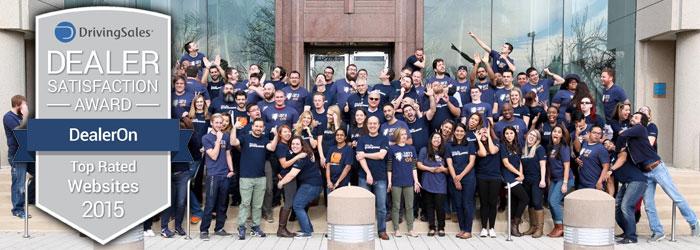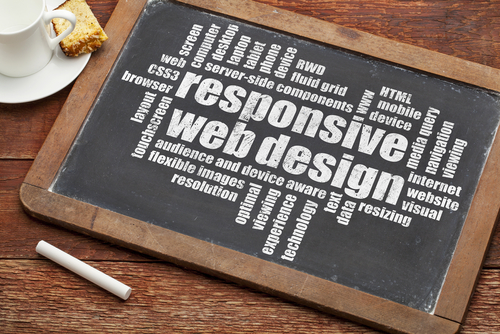Here’s the deal. We’re going to take you right to the source…the source of digital excellence, that is. We’re pleased to announce that our next Topgolf event is OFFICIALLY on the books. DealerOn’s signature Digital Strategy Summit is going to be held in Chicago, on August 2, at Topgolf Wood Dale! We’re partnering with Google once again, to bring you a ton of premium knowledge on all things digital in the world of automotive. Continue Reading

Derwood, Maryland – February 24, 2016 – DealerOn is the recipient of a “Top Rated” Website award in the seventh annual DrivingSales Dealer Satisfaction Awards.
Upon hearing the news, Ali Amirrezvani, DealerOn’s CEO and Co-Founder responded, “We are extremely proud DealerOn was able to take home the Top-Rated Website Provider Award, for the fifth year in a row. Our goal has always been to provide the very best support to our dealership partners and this award further validates that our continued commitment is paying off”. Ali continued, “Because the DrivingSales Dealer Satisfaction Awards are chosen by the very partners we aim to please day-in and day-out – our dealer customers – this award is particularly meaningful. If anything, this makes us want to work harder and we can’t wait to see what 2016 will bring.”
This award further validates DealerOn’s status as a top website provider in the automotive industry and showcases why they are the only company in the auto industry that offers a Guarantee that dealers will see an increase in leads when the move their website to the DealerOn platform. DealerOn’s website customers have seen a documented lead volume of 250% on average, across nearly 1,000 websites.
In addition to their award-winning dealership websites, DealerOn’s new offerings in automotive SEM and SEO are quickly becoming industry standards. As a Google AdWords Certified Partner, dealers that combine their Paid Search with the power of a DealerOn website see complete integration and optimization of the AdWords efforts. Dealerships that opt for their Elite SEO package reap the benefits of a Google-Optimized website architecture as well as Advanced Reporting, Custom Content, On- and Off-Site SEO, Social Media and Reputation Management.
“We congratulate DealerOn on being a ‘Top Rated’ Website Award recipient and for being recognized by its dealer customers for high levels of excellence and customer satisfaction,” said DrivingSales CEO and Founder Jared Hamilton. “For seven years, and through over 25,000 validated reviews, DrivingSales Vendor Ratings has helped dealers make smart, more informed decisions, leading them to outstanding service providers such as DealerOn.”
The DrivingSales Dealer Satisfaction Awards are based on cumulative ratings tallied and verified over the calendar year (January–December) at DrivingSales.com Vendor Ratings. DrivingSales Vendor Ratings is the industry’s only neutral, comprehensive vendor rating forum featuring real-time peer reviews and honest competitor comparisons, and provides dealerships with important information from actual customers who have hands-on experience using vendor products / solutions in their stores. Each rating is verified as coming from an actual dealership employee.
Full award results are available online here.

Your dealership probably has at least one review portal that your marketing efforts are focused on…Google? Facebook? Yelp? DealerRater? Which portal works best for your car dealership? Is your focus in line with the portal your customers prefer to use?
Mike Blumenthals, a local search and Google Places expert, recently created a Google survey to find out where American adult Internet users prefer to leave reviews online. After filtering out the 77.8% of survey takers that self-reported that they never or almost never leave reviews, Blumenthals asked the following question:
When you leave a review online for a local business, which site are you most likely to use?
- Google – 32%
- Facebook – 20.6%
- Yelp – 17.5%
While the margin of error allows for Yelp and FB to be neck and neck, this does show a growth in the desire to leave reviews on Facebook, even though they aren’t necessarily known as a review aggregator.
So, while users prefer to leave their online reviews on Facebook, it’s unfortunate for small businesses like your dealership that Facebook doesn’t highlight business reviews, nor does it really promote them. In fact, it can be downright difficult to find the reviews on your dealership’s business page. What is your dealership to do?
First, continue to focus on Google reviews. They are still the clear leader, and provide the most bang for your marketing buck given their dominance in the search engine market. Having a healthy number of reviews consistently flowing into your Google+ Local page gives your dealership a better chance of a high ranking in Google’s search results.
But don’t sleep on Facebook Reviews. They are a smart company, and they will put more of a focus on business reviews in the future. Given that their platform has almost accidentally become the 2nd biggest consumer review site, it is just a matter of time before business reviews become a highlighted part of Facebook for businesses. Make sure your dealership is ahead of the curve. Spend some time and effort building positive reviews on Facebook, since many consumers are already looking at them, and the number is likely to grow dramatically over time.
As for Yelp, could the recent controversy surrounding the quality and validity of their reviews beginning to discourage consumers from leaving reviews there? If you have shied away from Yelp, one thing you should be aware of is that Google’s recent Pigeon change (which I wrote about last week) has given Yelp reviews MUCH more visibility in Google (see this article by Matt McGee). But, it may just be easier and smarter for the long term to focus on building your dealership’s review volumes on Google and Facebook, since there’s little question about their long-term consumer influence. Has your dealership seen an increase in Facebook reviews?

In an effort to further optimize local search results, Google has begun rolling out a new tweak to its algorithm that some in the SEO community have tentatively labeled Pigeon. Dealer’s need to be aware of these changes because the Pigeon update is designed to improve local search listings for businesses (like car dealers).
According to Barry Schwartz at Search Engine Land, Google told them that “the new local search algorithm ties deeper into their web search capabilities, including the hundreds of ranking signals they use in web search along with search features such as Knowledge Graph, spelling correction, synonyms and more”. In addition, Google said that this new algorithm “improves their distance and location ranking parameters.”
It is not clear exactly how all of these changes will impact each dealer, so you should probably Google some of your top traffic-driving organic search keywords, and check the customer experience for anyone searching with local terms like “Toyota dealers near me” or “Ford dealers in Baltimore, MD”.
You should also check your Google Analytics account and compare this last week’s Organic Search Traffic vs. your prior Organic Search traffic levels, so you can determine the impact on your traffic and leads. If you would like any help doing this for your dealership’s Google Analytics account, whether or not you’re a DealerOn customer, just submit your contact information on our site or email me back, and include a comment “Google Analytics Help”.
Many Google users have reported seeing more listings from local directories when making searches – for example, searching for a restaurant name is now more likely to give you results from Yelp, Urbanspoon, OpenTable, and TripAdvisor. This increased focus on aggregate sites may make local search that much more difficult for your dealership website if it carries over into the automotive vertical.

These changes mean it is even more important than ever to ensure your dealership’s business information is the same (and accurate) across the Internet. Google looks for the NAP (name, address, phone number) of local businesses across the Internet, and is more likely to serve up your listing if it is consistent across all sites. Are you using a consistent business name (CDJR vs. Chrysler Dodge Jeep Ram)? Is your dealership using the same address across all local platforms? Your dealership website should be the main source for this type of information, so whatever you are using on your site (name, address, phone number) should be reflected throughout the Internet.
If your dealership is confused about where your business information is listed, consider using a tool like Yext. Yext scans local directories to identify and claim existing listings and reports your standings across hundreds of platforms. From there, you can manage your listings, correcting any errors you may find and help ensure that your dealership’s information is accurate where it matters most.
Need or want some assistance making sure your local directory listings are in order? Please contact me or DealerOn and we can help you through the process. It’s something our team routinely does as a part of our Client Results program, and would be more than happy to help your dealership stay on top of Google’s algorithm adjustments like the Pigeon update.

Much of what has been published over the last couple of years about responsive website design has surrounded its effect on search rankings. Google has made it very clear that they want, at a minimum, a uniform URL structure that presents the same basic information to people regardless of device. That is at the low end of what they deem as acceptable, and it’s in place to prevent rankings from dropping based upon inconsistencies between devices.
On the high end, Google wants websites that are built on responsive technology that present nearly the exact same page and information, formatted appropriately to the size of the screen and functionality of the device. Many in the SEO world believe that responsive website design will someday aid in improved organic rankings. Some believe that it’s already happening today.
One reason that Google recommends Responsive Design vs. Adaptive Design is the customer experience. Adaptive design websites rely on “user agent detection”. Adaptive websites use this user agent detection code to read which kind of device (phone, tablet, phablet, desktop, laptop, wearable) is visiting the site and then serve a version of the site for that device type. Google has expressly stated that it has found that user agent detection is error-prone and can result in adaptive sites serving the desktop version of the site to mobile devices and vice versa.
What has been lost in the mix is the experience itself. Google and other technology companies don’t just look at whether or not images resize or if text is big enough to read on the small screen. They’re pushing for responsive because, when done right, it can offer a unified experience. There is no other industry where this can be more important than the automotive industry.
The reason is based upon the depth of research. It’s not like buying something off of Amazon. Car buying is normally an extended set of steps that begins with different degrees of research and ends when the decision has been made to seek out an individual car or vehicle type. As a result, car buyers will often visit the same sites or pages over and over again during the process. In North America, it is common for these multiple visits to happen on different devices.
The uniform nature of responsive website design (RWD) makes it ideal for enhancing the car shopping experience online. With RWD, the images, buttons, videos, and text on a page are mostly the same from device to device but presented in a way that makes the most sense. For example, a vehicle details page may have the contact form on the right sidebar when viewed on a desktop, but that contact form can fall in line with the images and information about the vehicle when seen on a mobile device, all aligned within the same column.
With proper RWD, the individual pages can be enhanced for each device and screen size. A perfect example of this would be the addition of a Click-to-Call button that appears on the inventory when the screen is small. Since the small screen usually indicates a smartphone, having that Click-to-Call button makes sense to be available on mobile while it doesn’t make sense to have it present when the page is viewed on a 17” monitor.
Shoppers will often allow gaps between the different phases of their research. By presenting them a responsive experience on your website, you’ll allow for the triggers to remain in place that made them interested in a particular vehicle in the first place. This seamless type of experience enables car buyers to pick up where they left off rather than having to figure out how they got to a particular place on the website the last time they visited.
As you explore your website options and consider the different types of mobile websites available, look deeper into the numbers behind the equation. At the end of the day, a website should encourage lead forms, phone calls, and showroom visits. Adaptive or mobile-only websites might seem to offer a similar experience to the preferred responsive experience, but they do not. Even within the realm of RWD itself, there are good variations and bad variations. As with nearly all things, quality matters. Just because a company slaps an RWD badge on a website does not mean that it’s optimized to bring the proper shopper experience that your customers desire.

Look closely. Let the numbers guide you. Test how each website option operates on multiple devices. Your customers are not limited in the devices that they can use to explore your website. Make sure that you are aware of what they’re seeing and that it puts your dealership’s internet technology in a positive light.

